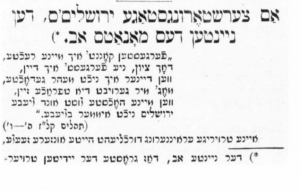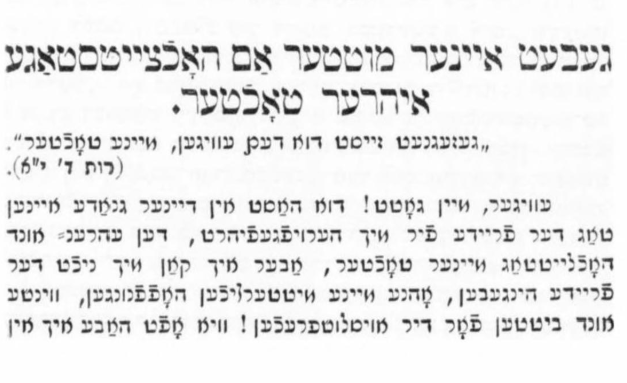Der neunte Ab, das größte der jüdischen Trauerfeste. An diesem Tage wurde einst der erste Tempel durch Nebucadnezar, der zweite durch Titus zerstört und das Israelitische Reich durch die Römer gänzlich aufgelöst. (“The ninth of Aḅ, is the greatest of the Jewish festivals of mourning. On this day the first temple was once destroyed by Nebuchadnezzar, the second by Titus, and the Israelite Empire was completely dissolved by the Romans.”)
| Source (German) | Translation (English) |
|---|---|
„Vergessen könnt’ ich meine Rechte, Doch Ẓion, nie vergess’ ich dein, Wenn deiner ich nicht mehr gedächte, Mög’ mir geraubt die Sprache sein, Wenn meine höchste Lust und Liebe Jerusalem nicht immer bliebe.“ (Ps. 137, 5–6.) |
“Let my right hand wither; Let my tongue cleave to the roof of my mouth, If I remember thee not; If I set not Jerusalem Above my chiefest joy.” (Psalms 137:5-6) |
Eine traurige Erinnerung durchzieht heute unsere Seele, unser Geist trägt uns hin in die alte Heimath unseres Volkes, an die Thore der Stadt, die man die königliche nannte. Weinend weilt unsere Seele in deinen Mauern, Jerusalem! – Jerusalem! wo ist deine Pracht und Majestät, wo sind deine Könige, aus Davids, des heiligen Sängers, Stamm entsprossen, wo ist dein Tempel, über dem die Glorie des Herrn strahlte? dein Allerheiligstes, worin der Allerhöchste thronte? Wo sind deine Altäre, worauf das freudvolle Gemüth seine Dankopfer niederlegte, und das reuegequälte Herz durch Sündenopfer sich Entlastung und Versöhnung verschaffte? Wo sind deine Priester, deine Propheten, diese Wortführer bei Gott für den Sündigen und Schuldigen, diese begeisterten Mahner und Warner der Menschheit, diese beredten Verkündiger des Göttlichen und Heiligen? |
A sad memory pervades our soul today, our spirit carries us to the old home of our people, to the gates of the city that was called the royal one. Where is your splendour and majesty, Jerusalem! – Jerusalem! where are your kings from the tribe of David, the holy singer, where is your temple, over which the glory of the Lord shone, your sanctuary, in which the Most High was enthroned? Where are your altars, upon which the joyful mind laid down its sacrifices of thanksgiving, and the repentant and tormented heart made atonement for its sins? Where are your priests, your prophets, these spokesmen before God for the sinner and the guilty, these enthusiastic admonishers and warners of mankind, these eloquent preachers of the divine and holy? |
Alles ist dahin, überall Trümmer und Vernichtung! – Mit Schmerz umfasse ich diese Trümmer und beweine deinen Untergang, unglückselige Stadt! Mit deinem Fall betraure ich auch den Fall meines Volkes. – Doch nicht mit dir, vor dir schon war mein Volk gefallen von der Höhe einer gottgeliebten Nation in den Abgrund der Sünde und des Treubruches an unserm Hort und Schöpfer; dein Sturz hat den ihrigen nur besiegelt und der Welt geoffenbart; Gottes strafende Hand in dir das Paradies wiederum zerstört, welches er dem sündigen Volke geschaffen und bereitet hatte. |
It’s all gone! Rubble and destruction everywhere! – I embrace these ruins with pain and weep for your ruin, wretched city! With your fall I entrust the fall of my people. – But not with you, for before you my people had already fallen from the heights of a nation beloved of God into the abyss of sin and breach of faith in our refuge and Creator; your fall has only sealed theirs and revealed it to the world; God’s punishing hand on you has again destroyed the paradise which He had created and prepared for the sinful people. |
Traure, meine Seele, traure, denn dieser Tag ist den trüben Erinnerungen des großen Verlustes geweihet; aber inmitten deiner Trauer tröste dich und preise gläubigen Sinnes Gott den Herrn, denn dieser Tag ist auch ein Tag des Trostes, ein Tag der ermuthigenden Hinweisung auf Gottes versöhnende Liebe und Gnade! Denn wie die Mutter das leichtsinnige, verirrte Kind mit der Hand züchtigt, aber mit den Blicken des Mitleids und des Erbarmens seine Thränen sieht, so hast du, mein Gott, dein Volk wohl gestraft, aber nimmermehr dein Angesicht von ihm abgewendet! Nach Jerusalems Fall haben wir uns wie verirrte Schafe zerstreut in alle Länder, unter die verschiedensten Völker, aber du, ein treuer Hirte deiner Heerde, ließest uns nimmer unter und verloren gehen. Die Stürme des Unglücks haben uns umtost, doch nur zu beugen, nicht zu brechen und zu vertilgen vermochte uns ihre Wuth; die Kälte des Hasses um uns her hat unsere Glieder erstarren gemacht, aber deiner Liebe Sonnenschein hat uns wieder erwärmet. Fluthen sind über uns dahingegangen, aber durch die Fluthen führte uns deine Gnadenhand ans grüne trockene Eiland. Noch sind wir dein Volk, noch sind wir deine Kinder, dein Zorn hat sich besänftigt, ein neues Vaterland hast du uns geöffnet, und wieder stehen wir, Menschen unter Menschen, Bürger unter Bürger, und alle Völker sind unsere Brüder. Und den Tempel – auch den wollen wir uns aufbauen nach Kräften und Vermögen: das Allerheiligste – das sei uns unser Herz, darin sollst du wohnen und thronen, und kein unheiliges, unreines Gefühl es entweihen; der Altar – das sei uns die leidende Menschheit; auf diesem geheiligten Altar wollen wir unsere Spenden und Opfer niederlegen; und wenn uns die Priester fehlen, so möge unsere gläubige Hoffnung und unser kindliches Vertrauen unser Priester und Fürsprecher sein vor deinem Throne. Amen. |
Grieve, my soul, grieve, for this day is consecrated to the dull memories of great loss; but in the midst of your grief, comfort yourself and praise God the Lord with a believing mind, for this day is also a day of consolation, a day of encouraging reminders of God’s reconciling love and grace! For as the mother chastises the reckless, lost child with her hand, but sees his tears with the eyes of compassion and mercy, so you, my God, have punished your people, but never turned your face away from them! After the fall of Jerusalem we were scattered like lost sheep to all the lands, among the most diverse peoples, but you, a faithful shepherd of your flock, never let us go down and perish. The storms of misfortune have overthrown us, but only to bend, not to break, and to destroy us their fury; the cold of hatred around us has stiffened our limbs, but your dear sunshine has warmed us again. Floods have passed over us, but through the floods Your hand of grace has led us to the green dry isle. We are still your people, we are still your children, your anger has been appeased, you have opened a new homeland for us,[1] i.e., in 1855, a reference to Bohemian Germany. and we are standing again, people among people, citizens among citizens, and all nations are our brothers. And the Temple – we also want to build it to the best of our ability: the blessed sacrament – be our heart, in it you shall dwell and sit enthroned, and no unholy, unclean feeling shall profane it; the altar – be the suffering humanity for us; on this sacred altar we want to lay down our donations and sacrifices; and if we lack priests, may our faithful hope and our childlike trust be our priest and intercessor before your throne. Amen. |
“Am Zerstörungstage Jerusalems, den 9. des Monats Aw.” by Fanny Neuda from her Stunden der Andacht (1855) is translated for the first time here. We have tagged this prayer as “problematic” owing to its normative reference to the physical punishment of children. –Aharon Varady
Source(s)


Notes
| 1 | i.e., in 1855, a reference to Bohemian Germany. |
|---|

“Am Zerstörungstage Jerusalems, den 9. des Monats Aw (תשעת באב) | [Prayer] on the day of Jerusalem’s destruction: the 9th of Av, by Fanny Neuda (1855)” is shared through the Open Siddur Project with a Creative Commons Attribution-ShareAlike 4.0 International copyleft license.


![[Gebet] An den ersten Tagen des Laubhüttenfestes | [A prayer] on the first days of Sukkot by Fanny Neuda (1855)](https://opensiddur.org/wp-content/uploads/2012/09/stunden-der-andacht-page_082.png)
![[Gebet] An den letzten Tagen des Laubhüttenfestes | [A prayer] on the last days of Sukkot, by Fanny Neuda (1855)](https://opensiddur.org/wp-content/uploads/2017/10/stunden-der-andacht-page_095.png)






Leave a Reply